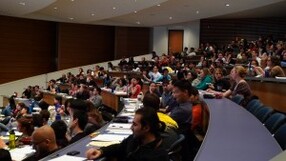Project SPROUT: Investigating Learning Environments in Higher Education

PI: Mark Warschauer, University of California, Irvine, School of Education
Investigators:
Lynn Reimer, University of California, Irvine, School of Education
Amanda Nili, University of California, Irvine, School of Education
Project Funding: National Science Foundation, September 12, 2012–August 31, 2015,
Grant No. 1256500, $300,000
Summary: The study used observations, interviews, document analysis, and video analysis to examine instructional practices in large undergraduate lecture courses at UCI, particularly in STEM (science, technology, engineering, and mathematics). The study began in 2012 with the intention of documenting the relative presence or absence of practices that potentially promote more active and engaged learning (e.g., enhanced faculty-student interaction, enhanced peer interaction, greater attention to problem-solving strategies, more opportunities for personalized learning, opportunities to receive and communicate information across diverse channels and modalities, more data-based instruction). We compared instructional practices with student outcome data to determine the efficacy of these promising practices, with the long-term goal of improving undergraduate education and increasing retention of diverse learners in STEM fields and beyond.
Investigators:
Lynn Reimer, University of California, Irvine, School of Education
Amanda Nili, University of California, Irvine, School of Education
Project Funding: National Science Foundation, September 12, 2012–August 31, 2015,
Grant No. 1256500, $300,000
Summary: The study used observations, interviews, document analysis, and video analysis to examine instructional practices in large undergraduate lecture courses at UCI, particularly in STEM (science, technology, engineering, and mathematics). The study began in 2012 with the intention of documenting the relative presence or absence of practices that potentially promote more active and engaged learning (e.g., enhanced faculty-student interaction, enhanced peer interaction, greater attention to problem-solving strategies, more opportunities for personalized learning, opportunities to receive and communicate information across diverse channels and modalities, more data-based instruction). We compared instructional practices with student outcome data to determine the efficacy of these promising practices, with the long-term goal of improving undergraduate education and increasing retention of diverse learners in STEM fields and beyond.


